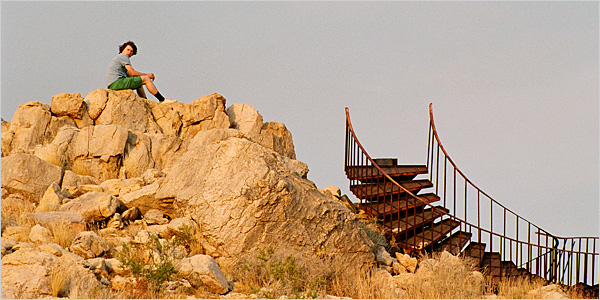FILM-FORWARD.COMReviews of Recent Independent, Foreign, & Documentary Films in Theaters and DVD/Home Video
Director: Goran Dukic. Produced by Adam Sherman, Chris Coen, Tatiana Kelly & Mikal P. Lazarev. Writer: Goran Dukic, based on the novella Kneller’s Happy Campers by Etgar Keret. Director of Photography Vanja Cernjul. Edited by Jonathan Alberts. Music by Bobby Johnston. Released by Autonomous Films. Country of Origin: USA. 88 min. Rated R. With Patrick Fugit, Shea Whigham, Shannyn Sossamon, Leslie Bibb & Tom Waits. Wristcutters: A Love Story has all the ingredients of an instant cult classic: young adult suicide, road trips in a washed-out desert landscape, a screenplay based on edgy Israeli writer Etgar Keret’s novella Kneller’s Happy Campers, a flying Tom Waits, endless cigarettes, and a beat-up car with a “Bermuda Triangle” under the front seat, where anything you drop disappears. Unfortunately, this dark romp quickly flattens into a hackneyed, disappointingly trite romance. Ironically, given the wild premise, the film suffers most from predictability. It opens to Zia (Patrick Fugit, of Almost Famous) cleaning his apartment and then slitting his wrists over a bloody sink. He dies while staring at dust in the corner of his room. “Offers,” or people who have committed suicide, end up in a gloomy purgatory where “everything is exactly the same, only a little bit worse.” All of the furniture is uncomfortable, the flowers colorless, and no one is allowed to smile. Zia spends his earliest days working at Kamikaze Pizzeria and meets Eugene (Shea Whigham), a mustachioed Russian musician who killed himself onstage and lives with his entire “offed” family. The two men while away the hours in grim Eastern bloc-style bars until Zia learns that Desiree (Leslie Bibb), his ex-girlfriend, has also killed herself. The flashbacks to how and why the minor characters dwelling in purgatory killed themselves are the film’s most riveting moments, and a scene in which Eugene’s family celebrate their “luck” dying together offers black humor familiar to fans of Keret’s work. On the search for Desiree, the men pick up a hitchhiker, Mikal (Shannyn Sossamon), who believes that she’s in purgatory by accident. When Mikal enters the picture, Wristcutters falters. Mikal seems less like a real girl who has committed suicide, accidentally or not, than a paper doll fantasy created by men whose last sexual encounter happened alone with a graphic novel. An adorable ingénue, with an innocent nature and flawless makeup that survives an interminable bare-bones camping trip, Mikal comes off as saccharine when she’s meant to be endearing. The problem is less with Sossamon’s performance than with Mikal’s lines, but her interaction with Eugene and Zia moves the film from the darkly sweet to the mundane. Keret is the son of Holocaust survivors, and the issues of life, death, forced exile, and escape that he explores in Kneller’s Happy Campers and other stories appear early in Wristcutters. His work is disturbing and persuasive, even when he has a transcendent message (such as, “you don’t know what you’ve got till it’s gone”). His characters remain ambiguous, and the world or worlds they inhabit stay complex and troubled.
Though Wristcutters creates an eerie and memorable purgatory, it ultimately stops short of exploring the real difference between life and
something just the same but a little bit worse. In Keret’s story, that difference is potential. In director Goran Dukic’s film, there isn’t any difference.
Elizabeth Brachner
|
